金融专业英语2002
02 Economics 金融英语

直接接标价法又叫应付标价法,是以一定单位的 外国货币为标准来计算应付出多少单位本国货币。 间接标价法又称应收标价法。它是以一定单位(如 1个单位)的本国货币为标准,来计算应收若干单 位的外国货币。
6
Purchasing power parity (PPP) 购买力平价
A theory which states that the rate of exchange between two currencies is in equilibrium when it exactly reflects the difference in cost of standard goods in the two countries. 购买力平价理论认为,长期而言,一项商 品只能有一个价格,即在不同国家购买同 一商品的成本应该是一样的;因此,当汇率 水平令各种货币的购买力相等时,汇率即 处于均衡水平。
9
Interest rate parity 利率平价
Interest rate parity says that the spot price and the forward or futures price of a currency incorporate any interest rate differentials between the two currencies. 利率平价理论 (Interest Rate Parity Theory)认为两个国家利率的差额相等于 远期汇率及即期汇率之间的差额。 远期差价是由两国利率差异决定的,并且 高利率国货币在期汇市场上必定贴水,低 利率国货币在期汇市场上必定升水。
其宗旨是促进国际金融合作,以维持汇率的安定, 扩展国际贸易,提高就业水平与实质国民所得, 并以资金供给会员国,调节会员国国际收支的暂 时性不平衡。
金融专业英语

金融专业英语1.The 3 main functions of commercial banks:the creation of money accomplished through lending and investing activitiesthe holding of depositsthe provision of a mechanism for payments and transfers of funds2.What are negotiable instruments?Negotiable Instruments are documents used in commerce to represent the ownership and secure the payment of money.3.Why do we need negotiable instruments when making payments?Paying large sums of money in cash is inconvenient and risky.Negotiable Instruments such as Bills of Exchange, Cheques and Promissory Notes are wildly used as instruments in the international settlement. They represent a right to payment. A right is a promise and not a tangible piece of property.4.What is a crossing?It is a direction to the paying bank that the money proceeds should be paid to the payee’s bank and not directly to the payee himself.General crossings: consisting of two transverse parallel lines across the face of the cheque.Special crossings: consisting of the name of a particular bank to which payment must be made, and the name itself is the crossing.5.What is the most important difference between bills of exchange and promissory notes?6.Why debit cards are named as “debit”cards?The amount of the purchase is immediately debited from the account and no credit is involved.7.fiduciary /fi‘dju:?i?ri/ a. 受托的n.受托人A company director owes a fiduciary duty to the company7.The three most-commonly used means of international settlement: remittancecollectiondocumentary creditThe other two means: standby L/C & bonds9.A documentary collection gives greater security than settlement on open account, because the importer cannot take possession of the goods without either making payment or accepting a bill of exchange. The banks concerned are under no obligation to pay.10.Can the exporter be sure at the time of dispatch of the goods that the buyer will actually pay the sum owed?No.So this form of settlement is therefore most appropriate in the following cases:if the exporter has no doubt about the buyer’s willingness and ability to pay;if the political, economic and legal environment in the importing country is considered to be stable;if the buyer’s cou ntry has placed no restrictions on imports (e.g. exchange controls) or has issued all the necessary authorizations.11Q: Why can the exporter retain control of the goods until payment or acceptance?Q: why under D/P condition, it is unnecessary to include abill of exchange?How to complete a instruction order? p25212.Clean Collection: a draft or cheque unsupported by documents Documentary Collectioin: documents with or without a draftQ: The disadvantages of clean collection13.The differences between them primarily lie in 4 aspects as follows:Whether there are banker’s credit involved in.Which party is the principal.When does the exporter ship goods.Which party is the drawee of the draft.Can you list any others?13.: What’s the contrast between negot iation and comfirmation?Negotiation advances are with recourse, so that if payment is not ultimately forthcoming from the issuing bank, the negotiating bank will be able to claim repayment from the beneficiary of the advance, plus interest. Confirmation advances are without recourse.14.Can the seller receive payment immediately after presenting the complying documents?In practice, this means that instead of receiving immediate payment on presentation of the documents (at sight), the seller’s draft is returned to him accepted on face by the nominated bank.15On what conditions can a transferable be used?When the supplier of goods sells them through a middleman and does not deal directly with the ultimate buyer.16.Why there is a need for a first beneficiary and a secondbeneficiary?The middleman may not wish to arrange a documentary L/C by himself, or his banker may not be willing to issue a credit on his behalf. Thus the middleman will approach the ultimate buyer and ask him to arrange a transferable credit in the middleman’s favor, which entitles the middleman as the first beneficiary. This transferable credit will allow the first beneficiary to request the bank authorized to pay, incur a deferred payment undertaking, accept or negotiate, or in the case of a freely negotiable credit, the bank specifically authorized as the transferring bank to make the credit available to one or more third parties known as “second beneficiaries”.17.What are the similarities and differences between transferable and back-to-back L/C?They are used in the same situations when the supplier of the goods and the ultimate buyer deal through a middleman, but the rights and obligations of the parties differ between them.17.When does the “back-to-back”aspect comes into play?The middleman applies to his bankers to issue one documentary credit on his behalf, but his bankers are not satisfied with his creditworthiness and insist that the middleman obtain a documentary credit in his favor from the ultimate buyer as security for one which the middleman has applied for in favor of the original seller.19. A revocable documentary credit gives the applicant maximum flexibility, since it can be amended, revoked or cancelled without the beneficiary’s consent and even without prior notice to the beneficiary up to the moment of payment by the bank at which the issuing bank has made the credit available.So the revocable documentary credit involves risks to the beneficiary. The seller may face the problem of obtaining payment directly from the buyer.In contrast, an irrevocable credit gives the beneficiary greater assurance of payment, for it cannot be cancelled or modified without express consent of the issuing bank, the confirming bank (if any) and the beneficiary.20Why can the beneficiary obtain a double assurance of payments under a confirmed credit?Because a confirmed credit represents the undertaking of both the issuing bank and the confirming bank.21..On what condition does the beneficiary require a confirmed credit?If the classification of the credit and the financial standing of the issuing bank are not satisfactory to the beneficiary, he may desire the credit confirmed by another bank.22.Q: Which kind of bonds gives maximum protection to the principal?。
金融专业英语 Unit 1 Money

Learning Targets
After learning this unit, you will be able to: understand the general definition of money; explain the functions of money; explain the forms of money; describe the contents of monetary system.
0 9 International Financing
1 0 Financial Derivatives
1 1 International Financial Institution
12
International Banking Regulatory Framework
Unit 1 Money
1.1 Introduction 1.2 Functions of Money 1.3 Forms of Money 1.4 Monetary System
1.1.1 History of Money
简单或偶然的价值形式
扩大的价值形式
一般价值形式
货币形式
Simple or Accidental Expanded Form of
Form of Value
Value
General Form of Value
Currency Form
1.1.1.1 Simple or Accidental Form of Value
1.1 Introduction
1.1.1 History of Money
Human society has existed for millions of years, but the emergence of money is only a few thousand years. There are many theories about the origin of money in history, but none of them have formed a complete theoretical system. Until Marx, from the view of dialectical materialism (辩证唯物 主义) and historical materialism (历史唯物 主义), explained the essence of money— the labor theory of value (劳动价值论). Marx believed that money originated from commodity exchange, and its economic root was private ownership. It was formed spontaneously in the process of commodity exchange.
《金融专业英语》习题答案

Chapter One Functions of Financial Markets 一.Translate the following sentences into Chinese.1.China’s banking industry is now supervised by the PBC and CBRC. In addition, the MOFis in charge of financial accounting and taxation part of banking regulation and management.目前中国银行业主要由中国人民银行和银监会进行监管。
此外,财政部负责银行业监管的财务会计及税收方面。
2.Currently Chinese fund management companies are engaged in the following business:securities investment fund, entrusted asset management, investment consultancy, management of national social security funds, enterprise pension funds and QDII businesses.目前中国的基金管理公司主要从事以下业务:证券投资基金业务、受托资产管理业务、投资咨询业务、社保基金管理业务、企业年金管理业务和合格境内机构投资者业务等。
3.China's economy had 10% growth rate in the years before the world financial crisisof 2008. That economic expansion resulted from big trade surpluses and full investment.Now China is seeking to move away from that growth model. The country is working to balance exports with demand at home.在2008年世界经济危机之前的那些年,中国经济增长速度曾达到10%。
刘铁敏《金融专业英语》(第2版)_电子课件_ (9)[24页]
![刘铁敏《金融专业英语》(第2版)_电子课件_ (9)[24页]](https://img.taocdn.com/s3/m/1e72b053a0116c175e0e4883.png)
➢ The London Metal Market and Exchange Company ➢ Chicago Mercantile Exchange ➢ New York Mercantile Exchange (NYMEX)
9.1.1 What is futures?
9.1.2 Margins
➢ To minimize credit risk to the exchange, traders must post a margin or a performance bond*, typically 5%-15% of the contract's value.
金 融 专 业 英语
Part Three
Financial Instruments and Foreign Exchange
Contents
7
8
9
Securities
ቤተ መጻሕፍቲ ባይዱ
Foreign Exchange
Futures & Options
9 Futures &
Chapter
Options
Learning Objectives(学习目标)
Students will be able to:
Master clearing, settlement and mark-to-market in future
Master the meaning, types and ways to trade of the options
经济学各学科专业名称中英文对照
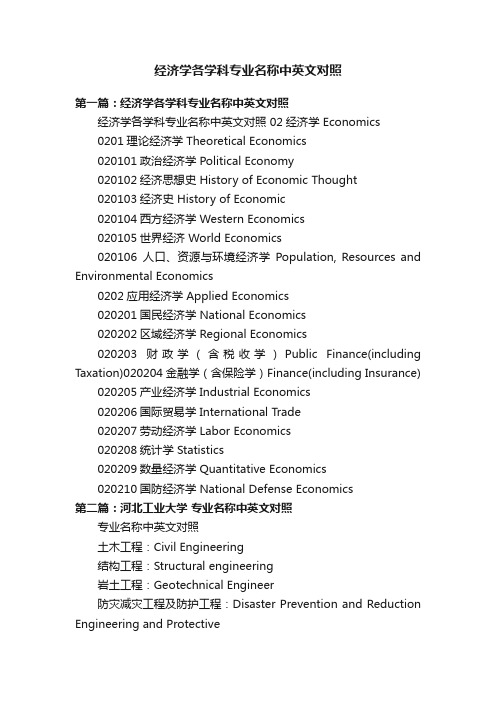
经济学各学科专业名称中英文对照第一篇:经济学各学科专业名称中英文对照经济学各学科专业名称中英文对照 02经济学 Economics0201理论经济学 Theoretical Economics020101政治经济学 Political Economy020102经济思想史 History of Economic Thought020103经济史 History of Economic020104西方经济学 Western Economics020105世界经济 World Economics020106人口、资源与环境经济学Population, Resources and Environmental Economics0202应用经济学 Applied Economics020201国民经济学 National Economics020202区域经济学 Regional Economics020203财政学(含税收学)Public Finance(including Taxation)020204金融学(含保险学)Finance(including Insurance) 020205产业经济学 Industrial Economics020206国际贸易学 International Trade020207劳动经济学 Labor Economics020208统计学 Statistics020209数量经济学 Quantitative Economics020210国防经济学 National Defense Economics第二篇:河北工业大学专业名称中英文对照专业名称中英文对照土木工程:Civil Engineering结构工程:Structural engineering岩土工程:Geotechnical Engineer防灾减灾工程及防护工程:Disaster Prevention and Reduction Engineering and ProtectiveEngineering桥梁与隧道工程:Bridge and Tunnel Engineering市政工程:Municipal Engineering道路与铁道工程:Highway and Railway Engineering建筑与土木工程:Architectural and Civil Engineering交通运输工程:Communication and Transportation Engineering第三篇:职务名称中英文对照职务名称中英文对照首席技术执行官CTO/VP Engineering技术总监/经理Technical Director/Manager信息技术经理IT Manager信息技术主管IT Supervisor信息技术专员IT Specialist项目经理/主管Project Manager/Supervisor项目执行/协调人员Project Specialist / Coordinator系统分析员System Analyst高级软件工程师Senior Software Engineer软件工程师Software Engineer系统工程师System Engineer高级硬件工程师Senior Hardware Engineer硬件工程师Hardware Engineer通信技术工程师Communications EngineerERP技术/应用顾问ERP Technical/Application Consultant数据库工程师Database Engineer技术支持经理Technical Support Manager技术支持工程师T echnical Support Engineer品质经理QA Manager信息安全工程师Information Security Engineer软件测试工程师Software QA Engineer硬件测试工程师Hardware QA Engineer测试员T est Engineer网站营运经理/主管Web Operations Manager/Supervisor网络工程师Network Engineer系统管理员/网管System Manager/Webmaster网页设计/制作Web Designer/Production技术文员/助理Technical Clerk/Assistant职务名称中英对照(2)那么多职务你搞不清它们的英文名字?别着急,这就给你来一个办公室职务名称大搜罗,保证你下次再看到英文的时候不会弄错哦。
金融专业英语参考[五篇范文]
![金融专业英语参考[五篇范文]](https://img.taocdn.com/s3/m/2cd6c9fe7e192279168884868762caaedd33baa4.png)
金融专业英语参考[五篇范文]第一篇:金融专业英语参考金融专业英语一、选择题(一共10题,每题2分,共20分)第8题和第16题替补再后面。
1.Only what happens if the supply is less than demand?(actual price is higher than the equilibrium price)2.When the Consumer income and established conditions for commodity prices is still, consumers can buy the two commodities to the greatest number of combinations.What did the Line call?(consumption may Line)3.Opportunity cost:(Measures the cost of doing “x” in terms of what else might be done)4.The normal downward slope of demand curves is necessarily explained by:(Limited spending power)5.For a closed two-good economy, the output of the two goods should be at the point where:(The highest indifference curve touches the production possibility curve).The “J-curve” shows that following depreciation:(The cost of imports rises immediately from the price effect, worsening the current account bal-ance, but later quantities of imports and exports respond and the current account balance im-proves)7.Which of the following statements about standby letters of credit is true? :(They can serve as a guarantee to a buyer against a seller defaulting)8.What information would you find in a statement of cash flows that you would not be able to get from the other two primary financial statements?(Total liabilities due to creditors at the end of the period)*8&16.Which of the following is not a characteristic of a competitive industry?(There is a fierce price war among rivals.)9.Which of these best describesthe U.S.Federal Reserve?(Responsible for monetary policy/money supply)10.What is the basic purpose of profits in our market economy?(Lead businesses to produce what consumers want)11.Which of the following will NOT cause a shift in the demand for baseballs?(An increase in the price of baseballs)12.Decreasing returns to scale may arise from(Inefficiencies in management)13.If the marginal rate of technological substitution(MRTS)is more than the price ratio of labor over capital(w/r), then to minimize cost the firm should Decrease the input of capital and increase the input of labor.14.The price of a good changes, both the substitution effect and the income effect reinforce each other, then the good is a(n)(Normal good)15.What market is the Most in need of the advertising?(Competitive monopoly market)16.American economist Modigliani’s life-cycle hypothesis is that:(Work time after retirement savings for the consumer finance)17.According to the rules of debit and credit for balance sheet accounts:(Decreases in asset and liability accounts are recorded by credits)18.Individuals will accept the medium of exchange in return for goods and services only if they are confident that:(They can exchange it for gold)19.The prices of meat products in a competitive market are determined by:(Supply and demand)20.Which one of the following is most likely to improve the wages of American workers?(An increase in productivity)二、阅读题(一共5题,每题4分,共20分)Reading A:Laura James is the head portfolio manager for national Fund 1.Assume an industry exhibits tendencies of “regression toward the mean.”This could mean all of thefollowing EXCEPT:(Profits increase as firms enter the industry)2.In a recessionary environment, an automaker such as Ford would be expected to:(Produce lower end vehicles)3.Assume domestic automakers are growing at a rate of –2%.Ford expects to increase its market share by 0.5%.What is Ford’s growth rate?(–1.51%)(1 + growth of firm sales)=(1 + growth of industry sales)x(1 + fractional change of market share)= 0.98 x 1.005= 0.9849Growth of firm sales = –1.51%4.Suppose instead that Ford’s growth of firm sales is expected to be –3% and the growth of industry sales is 1%.What is Ford’s expected change in market share?(-4%)0.97 = 1.01 x(1 + x)0.9604 = 1 + x–3.96% = x5.Which of the following scenarios would be most likely to have a positive impact on Ford’s market share?(An increase in its marketing budget)Reading B:Liquidity is a measure of how quickly an item may be converted to cash.1.Long-term assets are all assets other than current assets.(Doesn’t say)2.Supplies are less liquid than accounts receivable, and furniture and buildings are even less so.(Right)3.People are interested in liabilities on the balance sheet because it is relatively liquid.(Wrong)Reading C:Whereas the money markets provide very short-term loans, the capital market takes account of medium and long-term loans.4.An industrial corporate can meet its financial needs by seeking funds from the capital markets.(Right)5.Nowadays a private business usually obtains its workingcapital through a commercial bank.(Wrong)6.In the UK commercial banks often raise funds by issuing bands and stocks.(Doesn’t say)三、简答题(一共8题,每题5分,共40分)需要先把题目翻译成中文,用英语回答内容。
金融学用英语怎么说

金融学用英语怎么说金融学是研究价值判断和价值规律的学科。
主要包括传统金融学理论和演化金融学理论两大领域,是现代经济社会的产物。
那么你知道金融学用英语怎么说吗?下面来学习一下吧。
金融学的英语说法1:science of banking金融学的英语说法2:Finance金融学的相关短语:会计与金融学 Accounting and Finance金融学研究方法 Research Methods in Finance金融学大专学位 associate of finance金融学原理 Principle of Finance项目金融学 Project Finance金融学专业 Finance ; financial specialty ; finance major金融学季刊 Quarterly Journal of Finance金融学专题 Special Topics in Finance金融学的英语例句:1. People focus on why financial intermedia exiting renewedly with banking crisis emergence.金融中介机构为什么会存在,这一金融学的最基本问题,随着银行业危机的出现又一次重新被人们所重视.2. The Finance program is the Shanghai Municipal Key Program.金融学专业为上海市重点学科.3. Application and development of law and economics of law and finance theory.法律金融理论是法律经济学在金融学领域的运用和发展.4. This paper introduces the problem of option pricing inmathematical finance.粗略地介绍数学金融学中的期权定价问题.5. Behavior finance learns to get again of the whole world fixupon.行为金融学再次受到全球的瞩目.6. Yantai University finance expert Shijia Yue said.烟台大学金融学专家施嘉岳说.7. His book is a critique bordering on an assault on mathematical – or quantitative – finance.本书是对数学(或者定量)金融学几近抨击的一种批判.8. Finance theory prescribes holding well - diversified portfolios to reduce the overall risk of your investments.金融学理论主张通过持有多样化的投资组合来降低投资风险.9. The new discipline of emotional finance aims to show how emotion drives investors'behaviour.情感金融学这门新兴学科旨在表明情感如何驱动投资者的行为.10. Broadly speaking, liquidity and financial intermediation have emerged as key topics in macroeconomics and finance.从广义上讲, 流动性和金融调解在宏观经济学和金融学方面已经逐步成为一个关键的课题.11. Regional finance science is a boundary subject growing from regional economics, finance, and ecogeography.区域金融学是在区域经济学、金融学、经济地理学等学科的边界上生长起来的一门边缘学科.12. Cape was invented by Robert Shiller, professor of economics and finance Yale University.Cape是经周期调整的市盈率,由耶鲁大学YaleUniversity) 经济金融学教授罗伯特?希勒(RobertShiller) 发明.13. At Cornell University's Johnson School, finance professor Andrew Karolyi strikes a similar note.康奈尔大学( CornellUniversity )约翰逊学院(JohnsonSchool) 金融学教授卡洛伊(AndrewKarolyi)也持有类似的观点.14. This is about a theorem in finance. I will put it the fold.这是一个金融学的理论问题. 我将在接下来讨论它.15. This paper introduces this theory in the aim at broadening the scope of Knowledge.本文试图对行为金融学作一点介绍,以便开拓学界的视野.。
《金融专业英语(第2版)》教学课件—04Banking Industry in China
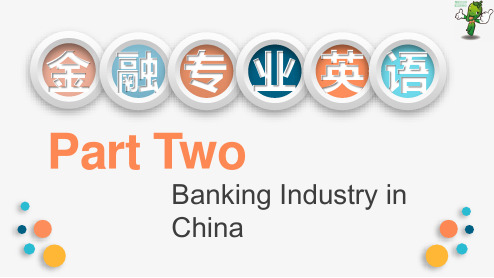
Part Two
Banking Industry in China
Contents
4
5
6
Central Bank—PBC
Commercial Banks
Supervision of Banking
4 Central
Chapter Bank—PBC
Chapter 4 Central Bank—PBC
Chapter 4 Central Bank—PBC
Section 4.1 The Reform of PBC Section 4.2 The Functions of PBC Section 4.3 The Instruments of Central Bank
Section 4.1 The Reform of PBC
➢ In 1984, the People’s Bank of China stopped ➢ handling credit and savings ➢ business. ➢ On March 18, 1995 , people’s Republic of China on the People’s Bank of
➢ In 1978, China has carried out a series of significant reforms in its banking system, and strengthened its opening to the outside world.
➢ In September 1983, the State Council* decided to have the PBC function as a central bank.
金融英语课件 chapter 2

Category of stock
• Common • Preferred/preferential
Preferred stock
• A hybrid
Features
• Priority to assets and earnings • Par value • Cumulative dividends • convertibility
Stocks sink amid Wall St
crisis
• US stocks suffered their biggest oneday decline on Monday since the market reopened after the terrorist attacks of September 11, 2001, as
Yields on short-dated government debt collapsed, falling far below 1 per
cent, amid frenzied buying
Stocks sink amid Wall St crisis
The Federal Reserve battled a ferocious storm in the overnight money market,
• The benchmark lending rate will be lowered by 0.27 percentage point to 7.20 percent fcuts rates, lowers reserve ratio
• However, benchmark deposit rates remain unchanged with the one-year rate to be kept at 4.14 percent, a proof that the central bankers are keeping an eye on inflation.
金融专业英语第二版课后答案
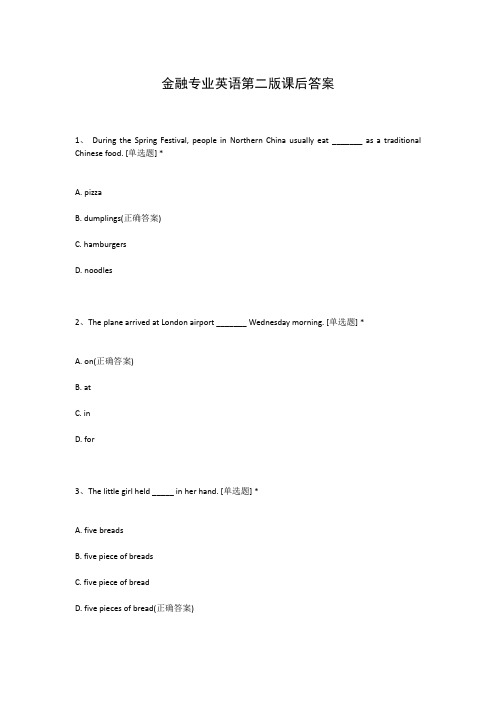
金融专业英语第二版课后答案1、During the Spring Festival, people in Northern China usually eat _______ as a traditional Chinese food. [单选题] *A. pizzaB. dumplings(正确答案)C. hamburgersD. noodles2、The plane arrived at London airport _______ Wednesday morning. [单选题] *A. on(正确答案)B. atC. inD. for3、The little girl held _____ in her hand. [单选题] *A. five breadsB. five piece of breadsC. five piece of breadD. five pieces of bread(正确答案)4、Many people prefer the bowls made of steel to the _____ made of plastic. [单选题] *A. itB. ones(正确答案)C. oneD. them5、You have been sitting on my hat and now it is badly out of(). [单选题] *A. dateB. shape(正确答案)C. orderD. balance6、You cannot see the doctor _____ you have made an appointment with him. [单选题] *A. exceptB.evenC. howeverD.unless(正确答案)7、There are trees on both sides of the broad street. [单选题] *A. 干净的B. 狭窄的C. 宽阔的(正确答案)D. 宁静的8、One effective()of learning a foreign language is to study the language in its cultural context. [单选题] *A. approach(正确答案)B. wayC. mannerD. road9、62.--There is? ? ? ? ? sale on in the shop today. Let’s go together.--Please wait? ? ? ? ? ?minute. I’ll finish my homework first. [单选题] *A.a; theB.a; a(正确答案)C.the; aD.the; the10、We sent our children to school to prepare them for the time _____ they will have to work for themselves. [单选题] *A. thatB. when(正确答案)C. whileD. as11、We have ______ homework today. ()[单选题] *A. too manyB. too much(正确答案)C. much tooD. very much12、My English teacher has given us some _______ on how to study English well. [单选题] *A. storiesB. suggestions(正确答案)C. messagesD. practice13、31.That's ______ interesting football game. We are all excited. [单选题] *A.aB.an(正确答案)C.theD./14、( )Keep quiet, please. It’s ________ noisy here. [单选题] *A. many tooB. too manyC. too muchD. much too(正确答案)15、—Look at those purple gloves! Are they ______, Mary?—No, they aren’t. ______ are pink. ()[单选题] *A. you; IB. your; MyC. yours; Mine(正确答案)D. you; Me16、The twins _______ us something about their country. [单选题] *A. told(正确答案)B. saidC. talkedD. spoke17、Neither she nor her friends ______ been to Haikou. [单选题] *A. have(正确答案)B. hasC. hadD. having18、I often _______ music from the Internet. [单选题] *A. download(正确答案)B. spendC. saveD. read19、It is reported()three people were badly injured in the traffic accident. [单选题] *A. whichB. that(正确答案)C.whileD.what20、Everyone here is _______ to me. [单选题] *A. happyB. wellC. kind(正确答案)D. glad21、His mother’s _______ was a great blow to him. [单选题] *A. diedB. deadC. death(正确答案)D. die22、Grandpa pointed to the hospital and said, “That’s _______ I was born?”[单选题] *A. whenB. howC. whyD. where(正确答案)23、45.—Let's make a cake ________ our mother ________ Mother's Day.—Good idea. [单选题] *A.with; forB.for; on(正确答案)C.to; onD.for; in24、69.Online shopping is easy, but ________ in the supermarket usually ________ a lot of time. [单选题] *A.shop; takesB.shopping; takeC.shop; takeD.shopping; takes(正确答案)25、80.Thousands of ________ from other countries visit the village every year. [单选题] *A.robotsB.postcardsC.tourists(正确答案)D.bridges26、Chinese people spend _____ money on travelling today as they did ten years ago. [单选题] *A. more than twiceB. as twice muchC. twice as much(正确答案)D. twice more than27、How beautiful the flowers are! Let’s take some _______. [单选题] *A. photos(正确答案)B. potatoesC. paintingsD. tomatoes28、Don’t ______. He is OK. [单选题] *A. worriedB. worry(正确答案)C. worried aboutD. worry about29、His father always _______ by subway. [单选题] *A. go to workB. go to schoolC. goes to bedD. goes to work(正确答案)30、____ is standing at the corner of the street. [单选题] *A. A policeB. The policeC. PoliceD. A policeman(正确答案)。
金融专业英语怎么说
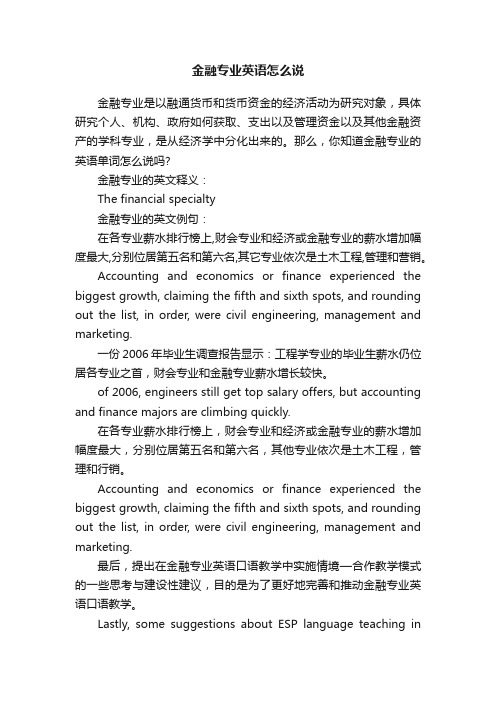
金融专业英语怎么说金融专业是以融通货币和货币资金的经济活动为研究对象,具体研究个人、机构、政府如何获取、支出以及管理资金以及其他金融资产的学科专业,是从经济学中分化出来的。
那么,你知道金融专业的英语单词怎么说吗?金融专业的英文释义:The financial specialty金融专业的英文例句:在各专业薪水排行榜上,财会专业和经济或金融专业的薪水增加幅度最大,分别位居第五名和第六名,其它专业依次是土木工程,管理和营销。
Accounting and economics or finance experienced the biggest growth, claiming the fifth and sixth spots, and rounding out the list, in order, were civil engineering, management and marketing.一份2006年毕业生调查报告显示:工程学专业的毕业生薪水仍位居各专业之首,财会专业和金融专业薪水增长较快。
of 2006, engineers still get top salary offers, but accounting and finance majors are climbing quickly.在各专业薪水排行榜上,财会专业和经济或金融专业的薪水增加幅度最大,分别位居第五名和第六名,其他专业依次是土木工程,管理和行销。
Accounting and economics or finance experienced the biggest growth, claiming the fifth and sixth spots, and rounding out the list, in order, were civil engineering, management and marketing.最后,提出在金融专业英语口语教学中实施情境—合作教学模式的一些思考与建设性建议,目的是为了更好地完善和推动金融专业英语口语教学。
《金融专业英语(第2版)》教学课件—01Money and Economics

economy.
Key Topics
1 What is Money; 2 Functions of Money; 3 Evolution of the payment; 4 Measuring Money; 5 Money Policy.
Text contents
Section 1.1 What is Money? Section 1.2 Functions of Money Section 1.3 Evolution of the Payment System Section 1.4 Measuring Money
在一般情况下,货币是在任何形式或可核查的记录中,被 普遍接受作为付款的商品和服务,并在一个特定的国家或 社会经济背景下可以偿还的债务。
What is “Money”?
Imagine a world without using of money Barter (物物交换)
What is “Money”?
Learn the functions of money;
2
Know the definition of money;
1
3 4
Learning Objectives
Understand how the money can be measured;
Learn how the
5
money policy can effect the
金 融 专 业 英语
Part One
Money and Economics
Contents
1
2
3
Money
Financial Markets
Polities and Economics
刘铁敏《金融专业英语》(第2版)-习题参考答案20
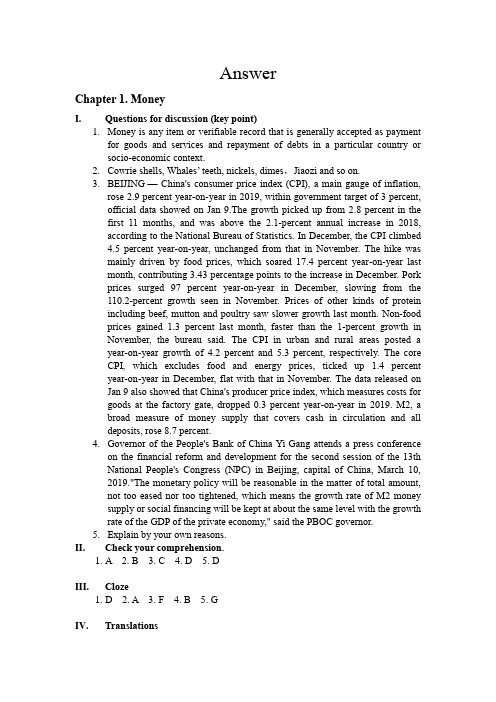
AnswerChapter 1. MoneyI.Questions for discussion (key point)1.Money is any item or verifiable record that is generally accepted as paymentfor goods and services and repayment of debts in a particular country or socio-economic context.2.Cowrie shells, Whales’ teeth, nickels, dimes,Jiaozi and so on.3.BEIJING— China's consumer price index (CPI), a main gauge of inflation,rose 2.9 percent year-on-year in 2019, within government target of 3 percent, official data showed on Jan 9.The growth picked up from 2.8 percent in the first 11 months, and was above the 2.1-percent annual increase in 2018, according to the National Bureau of Statistics. In December, the CPI climbed4.5 percent year-on-year, unchanged from that in November. The hike wasmainly driven by food prices, which soared 17.4 percent year-on-year last month, contributing 3.43 percentage points to the increase in December. Pork prices surged 97 percent year-on-year in December, slowing from the 110.2-percent growth seen in November. Prices of other kinds of protein including beef, mutton and poultry saw slower growth last month. Non-food prices gained 1.3 percent last month, faster than the 1-percent growth in November, the bureau said. The CPI in urban and rural areas posted a year-on-year growth of 4.2 percent and 5.3 percent, respectively. The core CPI, which excludes food and energy prices, ticked up 1.4 percent year-on-year in December, flat with that in November. The data released on Jan 9 also showed that China's producer price index, which measures costs for goods at the factory gate, dropped 0.3 percent year-on-year in 2019. M2, a broad measure of money supply that covers cash in circulation and all deposits, rose 8.7 percent.ernor of the People's Bank of China Yi Gang attends a press conferenceon the financial reform and development for the second session of the 13th National People's Congress (NPC) in Beijing, capital of China, March 10, 2019."The monetary policy will be reasonable in the matter of total amount, not too eased nor too tightened, which means the growth rate of M2 money supply or social financing will be kept at about the same level with the growth rate of the GDP of the private economy," said the PBOC governor.5.Explain by your own reasons.II.Check your comprehension.1.A2. B3. C4. D5. DIII.Cloze1.D2. A3. F4. B5. GIV.Translations1.Translate the English to Chinese(1)In the days of the gold standard, the volume of money and credit in circulationwas tied to the amount of gold in a country’s vaults.在金本位时代,流通中的货币和信贷量与一个国家的金库中的黄金数量是挂钩的。
金融学专业专业英语
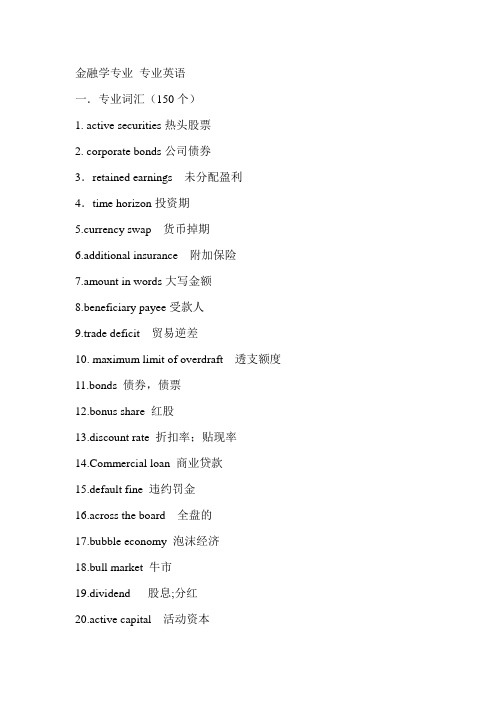
金融学专业专业英语一.专业词汇(150个)1. active securities热头股票2. corporate bonds公司债券3.retained earnings 未分配盈利4.time horizon投资期5.currency swap 货币掉期6.additional insurance 附加保险7.amount in words大写金额8.beneficiary payee受款人9.trade deficit 贸易逆差10. maximum limit of overdraft 透支额度11.bonds 债券,债票12.bonus share 红股13.discount rate 折扣率;贴现率mercial loan 商业贷款15.default fine 违约罚金16.across the board 全盘的17.bubble economy 泡沫经济18.bull market 牛市19.dividend 股息;分红20.active capital 活动资本21.savings accounts 储蓄存款帐户22.credit balance 贷方余额23.loan amount 贷款额24.cheque drawer 支票出票人25.credit cards 信用卡26.credit agreement 信贷协定27.reserve ratio 存款准备金比率28.issue bank 发行银行29.savings deposit 储蓄存款30.fixed deposit (=time deposit) 定期存款31.demand-deposit or checking-accounts 活期存款32. cash register 现金登记机,现金收入记录机,收银机33. dual trading 双重交易34. dumping 抛售35. financial world 金融界36. financial transaction 金融业务37.financial statement analysis 财务报表分析38. financial risk 金融风险39. financial lease 金融租赁40. electronic debts 电子借贷41.fundamental insurance 基本险42. future 期货43.futures commission merchants 期货经纪公司44.futures contract 期货合约45.futures delivery 期货交割46.futures margin 期货保证金47.futures market 期货市场48.futures price 期货价格49.futures transaction 期货交易50. cash receipts (CR) 现金收入51. cash receipts journal 现金收入日记帐52.cash records 现金记录53.cash ratio 现金比率54. draw 提款55. draw cheque 签发票据56. easy credit 放松信贷57.online-finance 在线金融58.online client (银行的)网上客户59.paper profit 帐面收益60.physical assets 有形资产61.project fund system 项目资本金制度62.share(stock) option 期权,股票认购权63. money-market 短期资本市场64. switch trade 转手贸易65. virtual bank 虚拟银行66. pension fund 养老基金67. venture-capital 风险资本ernment bond 政府债券69. shareholder 股东70. cook the book 做假帐71.regulatory system 监管体系72. audit 审计73. accounting firm 会计事务所74.Great Depression 大萧条75. recapitalize 资产重组76. automatic transfers between accounts 自动转帐77. balance 结余,差额,平衡78.bank balance 存款余额79.insurance contract 保險契約,保險合同80.insurance salesman 保險外勤81.insurance services 保險業務82.insure against fire 保火險83.appointed bank 外汇指定银行84.appreciation of exchange rate 汇率升值85.arbitrage 套利86.arbitrage of exchange 套汇87.arbitrage opportunity 套价机会88.arbitrage risks 套汇风险89.aftermarket 次级市场90.Interbank market 银行同业市场91.interest rate futures contract 利率期货合约92.interest rate policy 利率政策93.interest rate position 利率头寸94.interest rate risk 利率风险95.interest restriction 利息限制96.interest subsidy 利息补贴97.Industry and Commercial Bank 工商银行98.Swiss Bank Corporation 瑞士银行99.Standard Chartered bank 渣打银行100.Agricultural Bank of China 农业银行101.National City Bank of New York 花旗银行102.Hong Kong and Shanghai Banking Corp 汇丰银行103.foreign exchange crisis 外汇危机104.foreign exchange cushion 外汇缓冲105.foreign exchange dumping 外汇倾销106.foreign exchange earnings 外汇收入107.foreign exchange liabilities 外汇负债108.foreign exchange loans 外汇贷款109.foreign exchange parity 外汇平价110.foreign exchange quotations 外汇行情111.foreign exchange regulations 外汇条例112.foreign exchange reserves 外汇储备113.foreign exchange restrictions 外汇限制114.income in kind 实物所得115.income tax liabilities 所得稅債務116.income taxes 所得稅117.indemnity 賠償,補償118.indirect arbitrage 間接套匯119.insurance broker 保險經紀人120.insured 被保險人121.reserve 储备122.note 票据123.discount贴现124.circulate流通125.central bank 中央银行126.credit union 信用合作社127.paper currency 纸币128.credit creation 信用创造129.branch banking 银行分行制130.out of circulation 退出流通131.capital stock股本132.the gold standard金本位133.deficit 亏损134.default不履约135.auction拍卖136.collateralize担保137.markup价格的涨幅138.dealer交易员139.broker经纪人140.face amount面值141.floating-rate 浮动比率142.premium升水143.discount贴水144.deficit赤字145. funds statement 资金表146.capital movements资本流动147.foreign exchange dealings外汇交易148.balance of payment国际收支149.forward rate远期汇率150.cross rate交叉汇率二、专业英语句子翻译(20句):1.The more profitable the company is, the easier to raise funds for the buyout.公司越有投资价值,越容易筹款收购。
金融专业英语 chapter 2 Money and Economics

2.3.2 Functions of the money market
The money market functions are:
Financing
Industry
3
2
Financing Trade
1
Profitable Investment
4
Self-Sufficiency of Commercial Bank
markets;
1
Learn how to measure the Interest Rates;
3 4
Learning Objectives
Know the determinants of Asset Demand;
Understand
interest rates
5
and portfolio choice.
2.3.1 Participants
➢ Banks ➢ Finance companies ➢ Government institutes ➢ Importers/Exporters ➢ Retail and institutional money market funds ➢ Cash management programs ➢ Speculators ➢ Tourists
对外经济贸易大学金融学院金融专业英语试题及答案2002
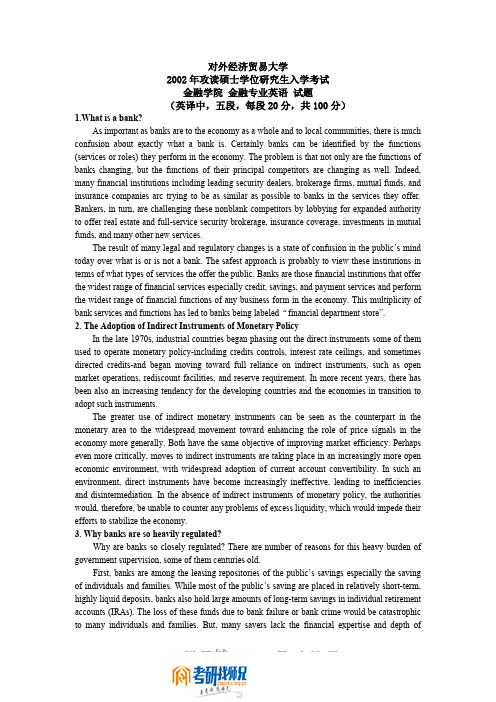
对外经济贸易大学2002年攻读硕士学位研究生入学考试金融学院金融专业英语试题(英译中,五段,每段20分,共100分)1.What is a bank?As important as banks are to the economy as a whole and to local communities, there is much confusion about exactly what a bank is. Certainly banks can be identified by the functions (services or roles) they perform in the economy. The problem is that not only are the functions of banks changing, but the functions of their principal competitors are changing as well. Indeed, many financial institutions including leading security dealers, brokerage firms, mutual funds, and insurance companies arc trying to be as similar as possible to banks in the services they offer. Bankers, in turn, are challenging these nonblank competitors by lobbying for expanded authority to offer real estate and full-service security brokerage, insurance coverage, investments in mutual funds, and many other new services.The result of many legal and regulatory changes is a state of confusion in the public’s mind today over what is or is not a bank. The safest approach is probably to view these institutions in terms of what types of services the offer the public. Banks are those financial institutions that offer the widest range of financial services especially credit, savings, and payment services and perform the widest range of financial functions of any business form in the economy. This multiplicity of bank services and functions has led to banks being labeled“financial department store”.2. The Adoption of Indirect Instruments of Monetary PolicyIn the late 1970s, industrial countries began phasing out the direct instruments some of them used to operate monetary policy-including credits controls, interest rate ceilings, and sometimes directed credits-and began moving toward full reliance on indirect instruments, such as open market operations, rediscount facilities, and reserve requirement. In more recent years, there has been also an increasing tendency for the developing countries and the economies in transition to adopt such instruments.The greater use of indirect monetary instruments can be seen as the counterpart in the monetary area to the widespread movement toward enhancing the role of price signals in the economy more generally. Both have the same objective of improving market efficiency. Perhaps even more critically, moves to indirect instruments are taking place in an increasingly more open economic environment, with widespread adoption of current account convertibility. In such an environment, direct instruments have become increasingly ineffective, leading to inefficiencies and disintermediation. In the absence of indirect instruments of monetary policy, the authorities would, therefore, be unable to counter any problems of excess liquidity, which would impede their efforts to stabilize the economy.3. Why banks are so heavily regulated?Why are banks so closely regulated? There are number of reasons for this heavy burden of government supervision, some of them centuries old.First, banks are among the leasing repositories of the public’s savings especially the saving of individuals and families. While most of the public’s saving are placed in relatively short-term, highly liquid deposits, banks also hold large amounts of long-term savings in individual retirement accounts (IRAs). The loss of these funds due to bank failure or bank crime would be catastrophic to many individuals and families. But, many savers lack the financial expertise and depth ofinformation needed to correctly evaluate the riskiness of a bank. Therefore, regulatory agencies are charged with the responsibility of gathering and evaluating the information needed to assess the true financial condition of banks in order to protect the public against loss.Banks are also closely watched because of their power to create money in the form of readily spendable deposits by making loans and investments. Changes in the volume of money created by banks appear to be closely correlated with economic conditions, especially the growth of jobs and the presence or absence of inflation.Banks are also regulated because they provide individuals and businesses with loans that support consumption and investment spending. Regulatory authorities argue that the public has a keen interest in an adequate supply of loans flowing from the banking system. Moreover, where discrimination in the granting of credit is present, those individuals who are discriminated against face a significant obstacle to their personal well-being and an improved standard of living. This is especially true if access to credit is denied because of age, sex, race, national origin, or similar factors.Finally, banks have a long history of involvement with government federal, state, and local. Early in the history of the industry governments relied upon cheap bank credit and the taxation of banks to finance armies and to supply the funds they were unwilling to raise through direct taxation of their citizens. More recently, governments have relied upon banks to assist in conducting economic policy, in collecting taxes, and in dispensing government payments.4. Financial FuturesA financial futures contract is an agreement between buyer and a seller reached today that calls for the delivery of particular security in exchange for cash at some future date . The market value of a futures contract changes daily as the market price of the security to be exchanged moves over time. As a result, futures contracts are “marked to marker” each day to reflect the current value of the assets subject to eventual delivery under each futures contract, and a cash payment may have to be made (usually to a broker) by one or the other party to the contract in order to protect against possible loss.The financial futures markets are designed to shift the risk of interest rate fluctuations from risk-averse investors, such as commercial banks, to speculators willing to accept and possibly profit from such risks. Futures contracts are traded on organized exchanges (such as the Chicago Board of Trade or the London Futures Exchange), where floor brokers execute orders received from the public to buy or sell these contracts at the best prices available. Then a bank contacts an exchange broker and offers to sell futures contracts (I, e., the bank wishers to “go short” in futures), this means it is promising to deliver securities of a certain kind and quality to the buyer of those contracts on a stipulated date at a predetermined price. Conversely, a bank may enter the futures market as buyer of futures contracts (i.e., the bank chooses to “go long” in futures), agreeing to accept delivery of the particular securities named in each contract and to pay cash to the exchange clearinghouse the day the contracts mature, based on their price at that time.5. Offshore Financial Center (OFC)An offshore financial center (OFC) may be defined as jurisdiction in which transactions with non-residents far outweigh transactions related to the domestic economy. They have developed by offering an attractive tax, legal and/or regulatory environment. In particular, the absence of inheritance, wealth, withholding or capital gains taxes can make the environment in OFCs very favorable to, for example, internationally mobile individuals. Zero or low direct taxes can make itattractive for companies conducting business with non-residents to incorporate in OFCs. Ina similar vein, the corporate legal environment may facilitate speedy adoption of new financial products or allow greater flexibility in restructuring and refinancing options. Political and economic stability and the presence of high quality professional (eg legal and accounting) and supporting services are also important in attracting business from other major financial centers.A number of important OFCs are small island states, with few domestically owned financial institutions, a large number of “brass-plate” institutions and little non-financial economic activity. The Cayman Islands and the British Virgin Islands are obvious examples. But the distinction between OFCs and other financial centers is not clear-out. Some economies. Such as Hong Kong and Singapore have a significant volume of entrepot business alongside domestically orientated financial intermediation. The term “OTC” is , furthermore, sometimes also used in connection with special tax and/or regulation zones that are established within the borders of a country to attract non-resident business (for example Labuan in Malaysia, or the International Financial Services Center in Dublin).1.银行是什么?无论是对于整个经济还是对于某一地区的经济而言,银行都是很重要的,同样地,人们对银行的准确含义也充满了困惑。
- 1、下载文档前请自行甄别文档内容的完整性,平台不提供额外的编辑、内容补充、找答案等附加服务。
- 2、"仅部分预览"的文档,不可在线预览部分如存在完整性等问题,可反馈申请退款(可完整预览的文档不适用该条件!)。
- 3、如文档侵犯您的权益,请联系客服反馈,我们会尽快为您处理(人工客服工作时间:9:00-18:30)。
对外经济贸易大学2002年攻读硕士学位研究生入学考试金融学院金融专业英语试题(英译中,五段,每段20分,共100分)1.What is a bank?As important as banks are to the economy as a whole and to local communities, there is much confusion about exactly what a bank is. Certainly banks can be identified by the functions (services or roles) they perform in the economy. The problem is that not only are the functions of banks changing, but the functions of their principal competitors are changing as well. Indeed, many financial institutions including leading security dealers, brokerage firms, mutual funds, and insurance companies arc trying to be as similar as possible to banks in the services they offer. Bankers, in turn, are challenging these nonblank competitors by lobbying for expanded authority to offer real estate and full-service security brokerage, insurance coverage, investments in mutual funds, and many other new services.The result of many legal and regulatory changes is a state of confusion in the public’s mind today over what is or is not a bank. The safest approach is probably to view these institutions in terms of what types of services the offer the public. Banks are those financial institutions that offer the widest range of financial services especially credit, savings, and payment services and perform the widest range of financial functions of any business form in the economy. This multiplicity of bank services and functions has led to banks being labeled“financial department store”.2. The Adoption of Indirect Instruments of Monetary PolicyIn the late 1970s, industrial countries began phasing out the direct instruments some of them used to operate monetary policy-including credits controls, interest rate ceilings, and sometimes directed credits-and began moving toward full reliance on indirect instruments, such as open market operations, rediscount facilities, and reserve requirement. In more recent years, there has been also an increasing tendency for the developing countries and the economies in transition to adopt such instruments.The greater use of indirect monetary instruments can be seen as the counterpart in the monetary area to the widespread movement toward enhancing the role of price signals in the economy more generally. Both have the same objective of improving market efficiency. Perhaps even more critically, moves to indirect instruments are taking place in an increasingly more open economic environment, with widespread adoption of current account convertibility. In such an environment, direct instruments have become increasingly ineffective, leading to inefficiencies and disintermediation. In the absence of indirect instruments of monetary policy, the authorities would, therefore, be unable to counter any problems of excess liquidity, which would impede their efforts to stabilize the economy.3. Why banks are so heavily regulated?Why are banks so closely regulated? There are number of reasons for this heavy burden of government supervision, some of them centuries old.First, banks are among the leasing repositories of the public’s savings especially the saving of individuals and families. While most of the public’s saving are placed in relatively short-term, highly liquid deposits, banks also hold large amounts of long-term savings in individual retirement accounts (IRAs). The loss of these funds due to bank failure or bank crime would be catastrophic to many individuals and families. But, many savers lack the financial expertise and depth ofinformation needed to correctly evaluate the riskiness of a bank. Therefore, regulatory agencies are charged with the responsibility of gathering and evaluating the information needed to assess the true financial condition of banks in order to protect the public against loss.Banks are also closely watched because of their power to create money in the form of readily spendable deposits by making loans and investments. Changes in the volume of money created by banks appear to be closely correlated with economic conditions, especially the growth of jobs and the presence or absence of inflation.Banks are also regulated because they provide individuals and businesses with loans that support consumption and investment spending. Regulatory authorities argue that the public has a keen interest in an adequate supply of loans flowing from the banking system. Moreover, where discrimination in the granting of credit is present, those individuals who are discriminated against face a significant obstacle to their personal well-being and an improved standard of living. This is especially true if access to credit is denied because of age, sex, race, national origin, or similar factors.Finally, banks have a long history of involvement with government federal, state, and local. Early in the history of the industry governments relied upon cheap bank credit and the taxation of banks to finance armies and to supply the funds they were unwilling to raise through direct taxation of their citizens. More recently, governments have relied upon banks to assist in conducting economic policy, in collecting taxes, and in dispensing government payments.4. Financial FuturesA financial futures contract is an agreement between buyer and a seller reached today that calls for the delivery of particular security in exchange for cash at some future date . The market value of a futures contract changes daily as the market price of the security to be exchanged moves over time. As a result, futures contracts are “marked to marker”each day to reflect the current value of the assets subject to eventual delivery under each futures contract, and a cash payment may have to be made (usually to a broker) by one or the other party to the contract in order to protect against possible loss.The financial futures markets are designed to shift the risk of interest rate fluctuations from risk-averse investors, such as commercial banks, to speculators willing to accept and possibly profit from such risks. Futures contracts are traded on organized exchanges (such as the Chicago Board of Trade or the London Futures Exchange), where floor brokers execute orders received from the public to buy or sell these contracts at the best prices available. Then a bank contacts an exchange broker and offers to sell futures contracts (I, e., the bank wishers to “go short”in futures), this means it is promising to deliver securities of a certain kind and quality to the buyer of those contracts on a stipulated date at a predetermined price. Conversely, a bank may enter the futures market as buyer of futures contracts (i.e., the bank chooses to “go long”in futures), agreeing to accept delivery of the particular securities named in each contract and to pay cash to the exchange clearinghouse the day the contracts mature, based on their price at that time.5. Offshore Financial Center (OFC)An offshore financial center (OFC) may be defined as jurisdiction in which transactions with non-residents far outweigh transactions related to the domestic economy. They have developed by offering an attractive tax, legal and/or regulatory environment. In particular, the absence of inheritance, wealth, withholding or capital gains taxes can make the environment in OFCs very favorable to, for example, internationally mobile individuals. Zero or low direct taxes can make itattractive for companies conducting business with non-residents to incorporate in OFCs. Ina similar vein, the corporate legal environment may facilitate speedy adoption of new financial products or allow greater flexibility in restructuring and refinancing options. Political and economic stability and the presence of high quality professional (eg legal and accounting) and supporting services are also important in attracting business from other major financial centers.A number of important OFCs are small island states, with few domestically owned financial institutions, a large number of “brass-plate” institutions and little non-financial economic activity. The Cayman Islands and the British Virgin Islands are obvious examples. But the distinction between OFCs and other financial centers is not clear-out. Some economies. Such as Hong Kong and Singapore have a significant volume of entrepot business alongside domestically orientated financial intermediation. The term “OTC”is , furthermore, sometimes also used in connection with special tax and/or regulation zones that are established within the borders of a country to attract non-resident business (for example Labuan in Malaysia, or the International Financial Services Center in Dublin).。
